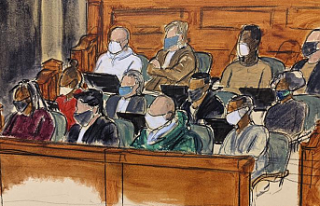On Tuesday afternoon, the jury asked Judge Regina Chu how they would proceed if they couldn't reach a decision. After roughly 12 hours of deliberations, which began Monday, Judge Regina Chu asked jurors how they should proceed.
The deliberations were resumed just before 8:30 a.m. Wednesday.
The trial of Kim Potter ends without a verdict.
Kim Potter, a former Brooklyn Center officer, has been charged with first-degree and second-degree manslaughter. Potter, 49, could face a sentence of approximately seven years if convicted of the most serious offense. However, prosecutors say they will pursue more.
Potter claimed she intended to use her Taser against Wright, but jurors had another question for Chu: Could Potter’s handgun, which was given to her along with her Taser, be released from the zip ties that kept it in an evidence container so they could handle?
Youtube video thumbnail
The evidence presented by the prosecution focused on the differences between the Taser and the gun, including their weight, feel and size. Prosecutor Erin Eldridge stated that jurors would have the opportunity to hold them during her closing argument. "To get a feel of the two, to get a sense for all the differences that you heard in court, to see for yourself how different they really were."
Over objection from Potter attorney Paul Engh who claimed that the gun should be kept in the box "for safety reasons", Chu stated that they could handle it.
Rachel Moran, a University of St. Thomas School of Law professor, warned against over-analyzing jurors' questions about their inability to reach a verdict. She pointed out that jurors weren't saying they were at an impasse.
Moran stated that the judge will "let them continue deliberating" if they don’t express concern or distress over how it’s going. Moran also stated that their desire to keep the gun shows they are still open to considering facts.
The judge has ordered the jury to be kept in seclusion during deliberations. This means they will remain under court supervision in an undisclosed location and can not return home until they reach a verdict.
Prosecutors accused Potter of making a "blunder epic proportions" regarding Wright's death at a traffic stop on April 11, but he denied that it was a defense.
Potter's lawyers countered that Wright was trying to escape officers while they tried to handcuff them for an outstanding warrant on weapons charges.
After about a week of testimony, the majority white jury won the case. It was about an arrest that went wrong. This sparked angry protests in Brooklyn Center as well as in nearby Minneapolis over Derek Chauvin’s trial in George Floyd’s death. Wright's death caused Potter to resign two days later.
Potter testified Friday that "she didn't want anyone to hurt" and that it was "sorry that it happened."
Chu informed jurors that intention is not part the charges and that the state does not have to prove that Potter attempted to murder Wright.
For first-degree manslaughter, the judge ordered that prosecutors prove that Potter caused Wright’s death by recklessly handling a firearm. They must prove that Potter committed a deliberate or intentional act while using or handling a firearm that created a substantial or unjustifiable danger that she was aware and disregarded and that she endangered safety.
Prosecutors must prove that she committed second-degree murder by proving she acted with culpable neglect. This means she knew she had the potential to cause death or great bodily injury.
___












